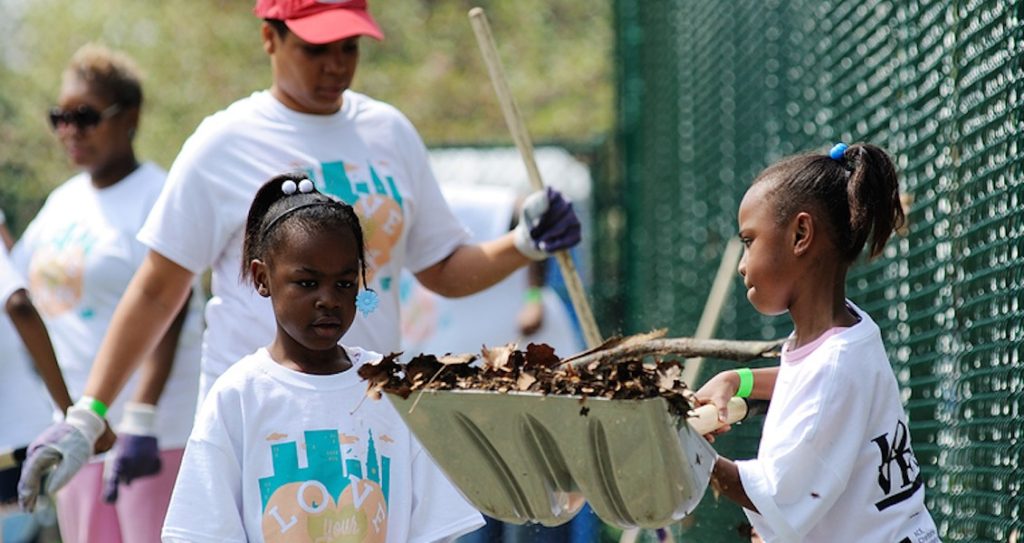Jasmine Hamilton always considered herself a grower. Raised in East Chicago, Indiana, her calling to work the earth’s soil stemmed from her midwestern roots—cultivated by long, sun-drenched days working on a farm with her grandmother.
When Hamilton moved to Philadelphia in 2003 to attend Moore College of Art and Design, she was surprised to see sustainable farming and gardening practices from home being implemented in the city, too. The longer she lived in the region, the more she saw people practicing urban agriculture—nestling community gardens within backyards, on top of rooftops, in vacant lots and just about every open space they could find and get their hands on.
Hamilton, who is the outreach coordinator for Farm Philly and an active member of Philadelphia Food Advocacy Committee, Philadelphia Area Cooperative Alliance and Soil Generation, started to wonder if her work might be part of something bigger; part of a movement to ensure all individuals live quality lives. Little did she know, the movement was about to experience a big boost through a new city plan called Greenworks.
In 2009, as Hamilton developed her work as an educational farmer teaching children in underserved communities how to grow their own food, then-Mayor Michael Nutter worked on upholding his inaugural promise to make Philadelphia the greenest city in the country. He opened the Mayor’s Office of Sustainability (OOS) and created Greenworks, a comprehensive sustainability plan encompassing the very movement Hamilton was now part of. Partly modeled after a successful New York City initiative called PlanNYC, Greenworks offered 15 sustainability targets with intricate success metrics in five alliterative areas: energy, environment, equity, economy and engagement.
“When government demonstrates through a plan or policy what their goals are, it’s easier to have a sense of where we can go together,” says Anna Shipp, executive director of Sustainable Business Network. “Greenworks offered a much friendlier conversation about what our city can look like. If the city didn’t have a comprehensive sustainability plan, then our work would have a different focus. But because they named sustainability as a priority, our work pivots to how we can accomplish the vision.”
In what may be one of Nutter’s signature achievements as mayor, Greenworks achieved several critical goals during its time under the administration, including transforming the city’s stormwater management efforts. Despite the success, Hamilton doesn’t remember hearing much about those early years; a 2015 Greenworks progress report offered an explanation why: The plan didn’t do a great job of making goals relevant to the everyday Philadelphian. As Mayor Kenney took office and his administration conducted their own research, feedback from town halls, online surveys and social media churned up similar results.
“We heard from folks that understanding the state of sustainability and progress on a basic level was important, but we also heard they felt Greenworks was really inaccessible,” says current OOS Deputy Director Sarah Wu. Many residents wanted to see themselves in the plan, not just the numbers.
The Kenney administration released Greenworks: A Vision for A Sustainable Philadelphia in November 2016, tweaking Nutter’s environmental goals with a series of “visions” that start with the words “All Philadelphians…”—as in, “All Philadelphians have access to healthy, affordable, and sustainable food and drinking water.”
It also created Greenworks On The Ground. Part-Sparknotes and part-grocery list, the guidebook offers a summary of each vision along with special “take action” checklists for individuals, communities and institutions.
“Having a strong community is the basis of having a sustainable community,” says Wu. “If you know your neighbors, you’re less likely to throw trash on the ground. If you know your neighbors, you’re more invested in creating a place that is helping everyone. If you know your neighbors, you can learn from them and find more ways to improve together.”
“People on the ground are important players in achieving our Greenworks visions because their expertise in how their communities work and what their communities care about gives them a deep understanding of how to prioritize and accomplish sustainability work in Philadelphia’s many contexts,” says Wu.
Through her current work, Hamilton knows a lot of communities. She says the tasks outlined in Greenworks on The Ground are both clear and doable for most Philadelphians. They’re also imperative for the future. “The work we do does not just change people in this lifetime,” says Hamilton. “It also changes people in lifetimes to come. When we give people seeds to grow, we’re giving people tools they can walk away with.”
In honor of Earth Day, we’ve hand-picked eight small actions from Greenworks on The Ground to help you get started—or continue—greening your city. As Hamilton says: “Take it, and go make your own from it!”

